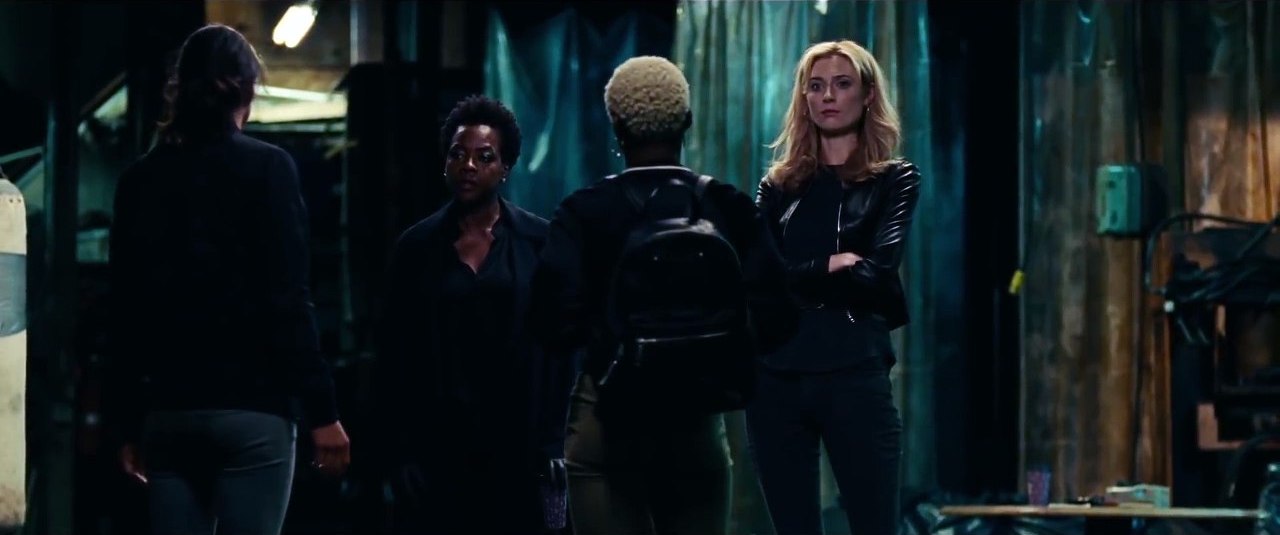
MPAA Rating: R | Rating: ★★★½
Release year: 2018
Genre: Crime, Drama Director: Steve McQueen
Widows is the rare film I wish was longer. Its source material is a 1983 British TV series, and you can tell–filmmaker Steve McQueen (Hunger, Shame, 12 Years a Slave) condenses the multiple narrative threads and plethora of characters to 129 minutes. It embraces its “Michael Mann’s Heat, but with women” aesthetic blend of crime, politics, and character study–this would have worked so much better as a mini-series exploring every single character’s story, but then it couldn’t qualify for the Oscars.
As the title infers, Widows is about the ongoing lives of women whose husbands have died. Veronica (Viola Davis) learns that her criminal husband Harry (Liam Neeson) and his crew have been killed in a shoot-out with a Chicago SWAT team after a botched theft stealing funds from an up-and-coming politician Jamal (Brian Tyree Henry) who is challenging Jack (Colin Farrell) for his alderman position. Jamal wants his money back, and his sadistic brother Jatemme (Daniel Kaluuya) give Veronica one month to make good on what her husband lost. Veronica approaches two of the other women, Linda (Michelle Rodriguez) and Alice (Elizabeth Debicki), to help her complete a heist Harry was planning. Viola Davis puts in another amazing “I’m crying and my nose is running but I refuse to wipe it” performance, and Debicki and Rodriguez are solid too. Cynthia Erivo as a babysitter/escape driver is also notable, giving a memorable physical performance in what grows from a supporting role into something more substantial. Oh, there’s also Robert Duvall as Farrell’s angry racist father, Carrie Coon as another widow, Garret Dillahunt as Veronica’s personal driver, Lukas Haas as a wealthy architect who uses Debicki as a personal escort, and Jacki Weaver as Debicki’s crazy mom. I’m sure I’m missing someone here; there are too many characters to keep track of in this ensemble cast, and while every single one is interesting, the film’s narrative gives too much attention to some (Haas) and not enough to others (Weaver, Coon).
The multiple (read: too many) narrative threads and Widows‘ self-importance about politics/culture bogs it down. It clearly is trying to say Important Things About Our World Today, but does so with the subtlety of a shotgun blast. For example, in a flashback, Veronica and Harry’s son is unjustly gunned down by Chicago cops in 2008 as large Obama posters loom in the background. Thus, I found Widows to be best appreciated as a technical exercise. In the opening scene, McQueen films the heist-gone-wrong interspersed with the various couples’ interactions, a rhythmic montage of intimacy and intensity. He seems to be experimenting with the heist genre (albeit I don’t think he experiments enough, a la Soderbergh) as evidenced by his unique cinematography within cars. As the escape van drives away, its back door hanging on the hinges while a man bleeds from a gunshot wound, the camera remains fixed in the car’s interior, a long(ish) shot taking us along for the ride with these hopeless criminals as police cars give chase. McQueen is taking us along for a ride, and the camera will not look away. Watching Widows, I found myself paying attention every time someone got into a car, as the in-vehicle camerawork was noticeably interesting. A long pan over the hood of a car as a white politician drives through Chicago neighborhoods reveals that poverty and wealth sit mere blocks apart. Widows also has a lot of religious imagery, including a lengthy scene in a black megachurch as part of an inessential subplot about Jack and Jamal vying for the pastor’s endorsement. Even as the tension slowly builds, the heist itself is not all that impressive (apart from a brief car chase–McQueen loves car scenes!), amounting to a home invasion robbery.
Widows‘ screenplay is a mashup of Gillian Flynn (Gone Girl) and McQueen himself, and based on Lynda La Plante’s source material. The script portrays each women so inconsistently as to become ciphers for whatever the scene needs in a given moment–sometimes they’re scared and helpless, other times they’re hardened and capable (sometimes all of the above in the same scene). Some might call these characterizations “complex,” but I think the script is just more confused. Still, while I’m flummoxed by the high critical praise this is receiving, Widows is nevertheless a technical feat and an impressive cast of great actors and actresses all giving good performances.
The book of James says that pure and undefiled religion is this: to take care of widows and orphans, and to keep oneself unstained from the world. In this, Widows is a cinematic midrash or commentary on James’ religious ethic, a depiction of what happens when widows are forced to take matters into their own hands, becoming stained by the broken world of men who abuse their power.
IMDB Listing: https://www.imdb.com/title/tt4218572/
Leave a Reply